‘Take Care of Maya’ trial: Defense witnesses shocked by ketamine doses given to child as $220M case continues
VENICE, Fla. - Jurors in the ‘Take Care of Maya’ trial continue to hear from defense witnesses on Wednesday in a $220 million case against Johns Hopkins All Childrens Hospital.
Lisa Rek was the first to take the stand on Wednesday morning. She is a registered nurse who was at Johns Hopkins All Children’s Hospital while Maya was at the facility.
She testified that Maya had a specific morning routine which consisted of waking up, going to the bathroom, brushing her hair, and picking out an outfit for the day.
Rek said Maya was extremely modest, so the nurse would place the clothes close to Maya, close the blinds and the nurse in the room would hold up a blanket to give her privacy while she dressed herself.
Rek explained to the jury that Maya was at a heightened risk for falls after she fell while using the restroom. That's why, according to Rek, Maya's bathroom door and door to her room had to be open a crack while she was in the restroom.
Rek stated she believed Maya appreciated the nurses who treated her, and Maya even nominated a nurse for a Daisy Award. Rek was also nominated for a Daisy Award by a co-worker during Maya’s hospitalization.
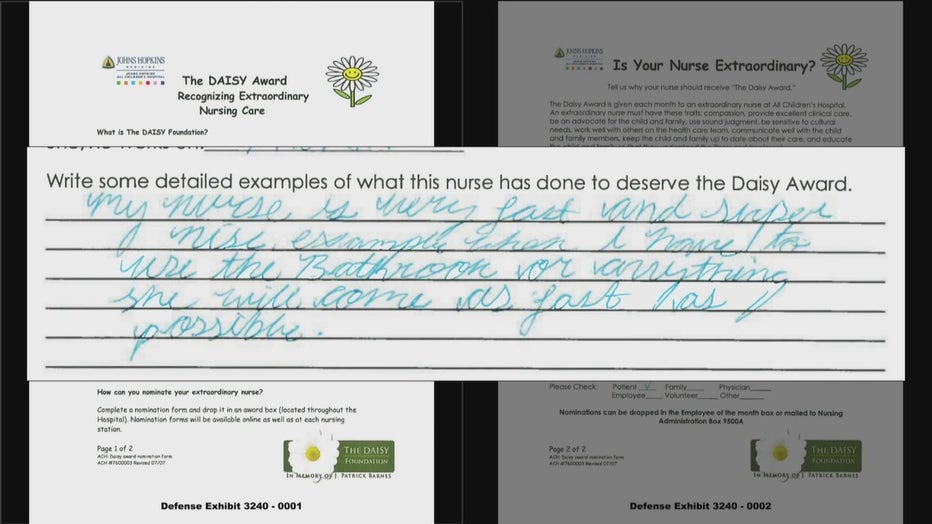
Maya nominated a nurse for a Daisy Award while she was at Johns Hopkins All Children's Hospital.
Rek said took Maya's laundry home twice, washed it and brought it back to the hospital. She said she washed Maya’s clothes, so she would be able to wear her own clothes instead of a hospital gown. However, Rek admitted she did not ask permission from Maya’s parents to take home her clothes for washing.
Rek noted that Maya was a beautiful, smart little girl who was a good patient.
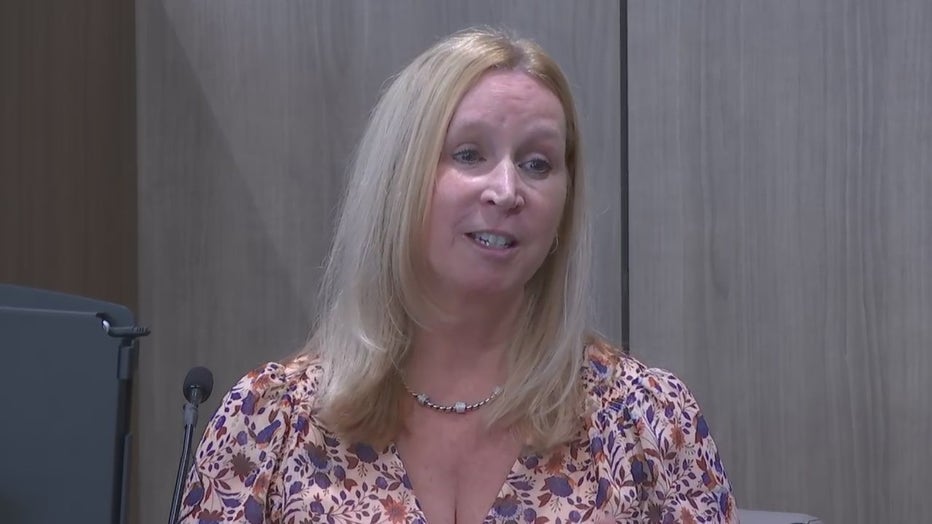
Registered Nurse Lisa Rek was the first witness to testify on Wednesday morning.
Mark Anderson, who held several executive leadership positions at healthcare facilities, and was the chief operating officer for a children’s hospital in Wisconsin, also testified on Wednesday.
He explained how a multidisciplinary children’s hospitals work, the organizations that hold the facilities accountable and the process of employee performance reviews.
Specifically, Anderson was asked about performance reviews of social worker Catherine Bedy.
Bedy was the social worker assigned to Maya and the Kowalski family dropped its case against her shortly before the trial began.
A video recorded deposition of Bedy was played for the jury several weeks ago while the plaintiffs were presenting their case.
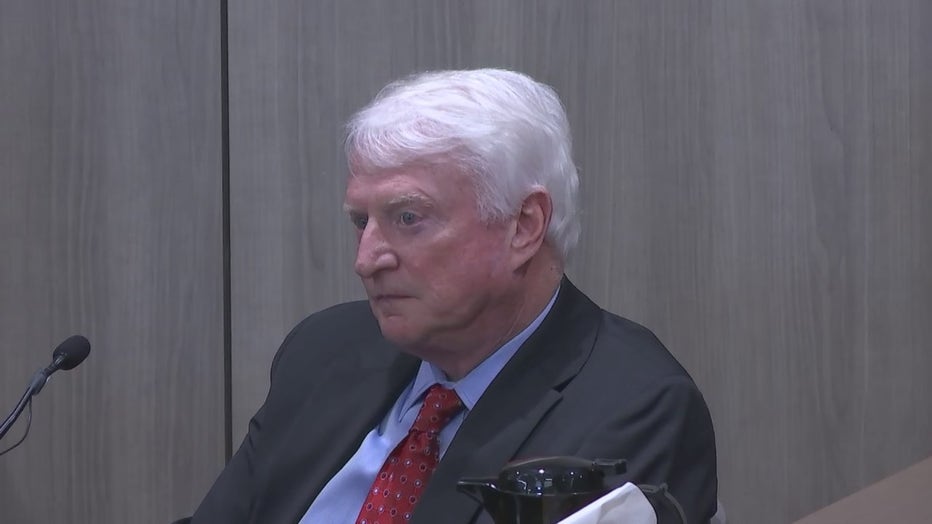
Mark Anderson testifies for the defense in the 'Take Care of Maya' trial.
She began her deposition by explaining how she was written up by the hospital after yelling at a co-worker after an attorney asked her if she had ever been disciplined at work.
On Wednesday, Anderson told jurors that Bedy was reviewed positively by her peers, but noted she was given an oral warning after a verbal argument with a colleague.
During cross-examination, the Kowalski's attorney noted that social worker Catherine Bedy had been counseled several times about her interactions with co-workers.
She was documented as saying, "Do you want to take this outside?"
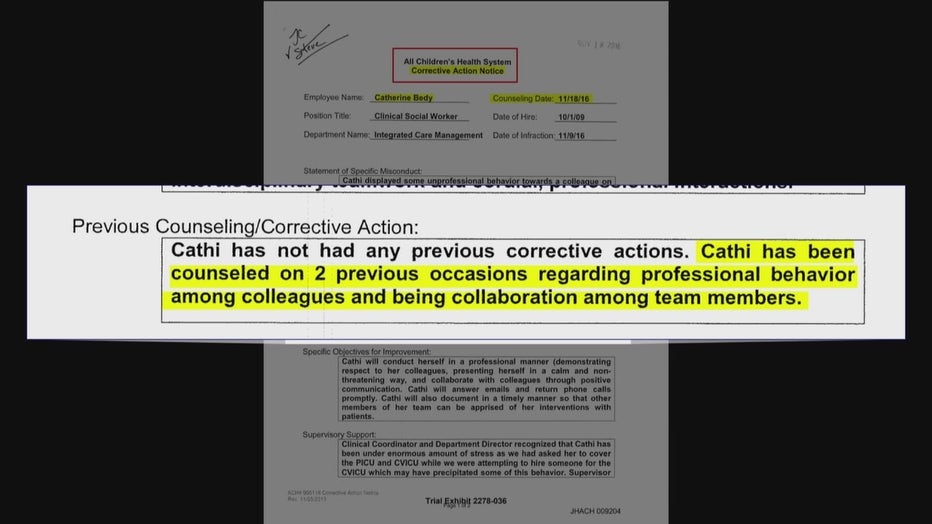
Anderson stated that Bedy appeared to receive counseling on her behavior based on Human Resources records he reviewed.
He added that he didn’t see anything that would prohibit Bedy from being assigned to Maya.
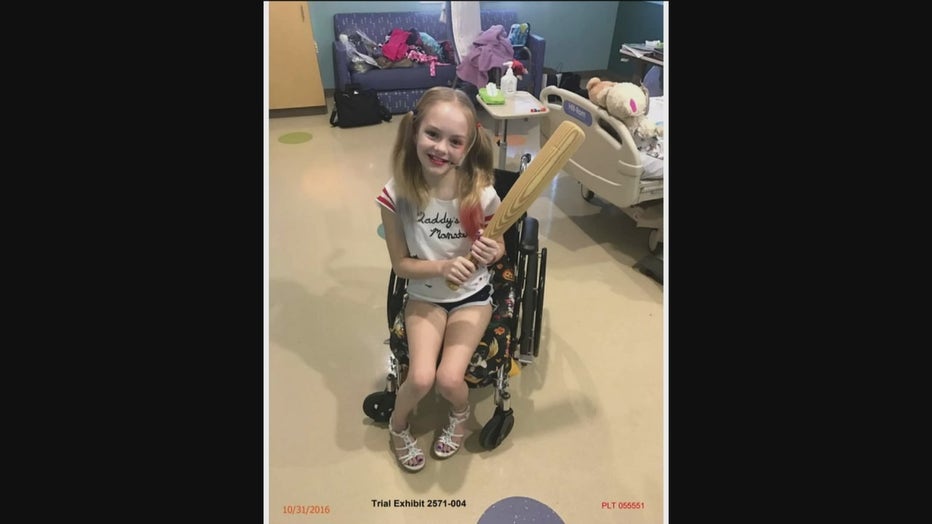
Pictured: Maya at a Halloween event at the hospital.
Dr. Elliot Krane, professor emeritus of anesthesiology from the Stanford University School of Medicine, who helped launch the pediatric pain center at Stanford University and treated lots of children with CRPS took the stand on Tuesday.
Dr. Krane testified that though he never treated Maya, he did review her medical records and does not believe she suffered from CRPS.
He also told the jury that he believed Maya had become dependent on ketamine and had developed a tolerance to the painkiller, which was prescribed by St. Petersburg physician Anthony Kirkpatrick to treat her CRPS.
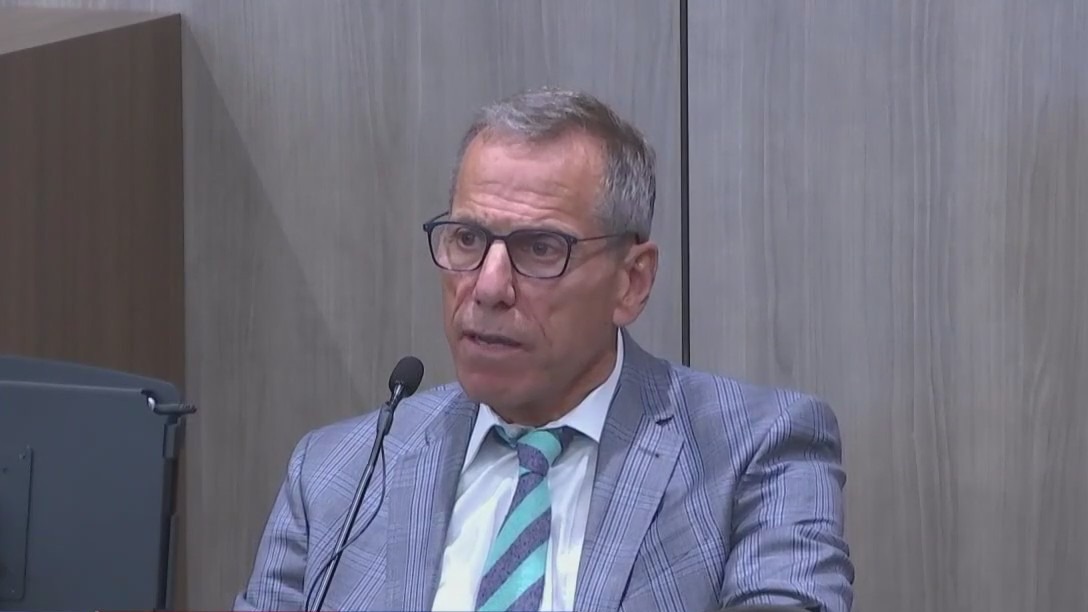
Medical expert testifies about Maya's treatment
Dr. Elliot Krane, an expert from Stanford University who has experience in pediatric pain management and Complex Regional Pain Syndrome, took the stand on Tuesday morning for the defense and was cross-examined in the afternoon. He stated that the ketamine treatments Maya was given was not the standard care for a child with CRPS.
"They can’t wait to get their next dosage of ketamine, they’re anxious, sometimes begging for ketamine. They feel pain, because it’s all the opposite of what ketamine does," Dr. Krane said.
Medical staff at Johns Hopkins All Children's Hospital told jurors that Maya was swearing at them and demanding sedatives when she was brought to the facility in October 2016 for what she described as a flare up from CRPS. Dr. Krane stated that he believes the abdominal pain that led Maya's parents to bring her to the hospital in 2016 was caused by ketamine.
RELATED: ‘Take Care of Maya’ trial: Maya testifies again in $220 million case against All Children’s Hospital
Under oath, Maya told jurors her condition would leave her screaming in pain and unable to walk at the time. She said she had been receiving ketamine to treat the pain and even underwent a ketamine coma in Mexico.

Maya Kowalski returns to the stand
Maya Kowalski returned to the stand Friday in the "Take Care of Maya" trial happening in Sarasota County. Her family is suing for millions after what they say was medical kidnapping by Johns Hopkins All Children's Hospital.
She explained that the ketamine treatment worked, and she was improving until October 2016, when she says she experienced a flare up of pain.
However, Dr. Krane stated that Maya was receiving 10 times the amount of ketamine for someone her size and she should have been receiving physical, occupational and psychological therapy for the pain she said she was experiencing.
Dr. Krane wasn't the only physician surprised by the amount of ketamine Maya was taking.
"I was quite surprised and shocked at the amount of ketamine that was reported, "stated Dr. Richard Andrew Elliot, an anesthesiologist at Johns Hopkins All Children's Hospital. "They were way higher than any doses I had ever seen given to a child."

Doctors testify in 'Take Care of Maya' trial
On Monday, doctors testified about why they believed Beata Kowalski was suffering from Munchausen by proxy.
Why was Maya kept at the hospital?
Dr. Krane told jurors that Maya did receive a lower dose of ketamine while at Johns Hopkins All Children’s Hospital to prevent withdrawal symptoms and slowly wean her off the drug.
However, Maya’s mother, Beata Kowalski, wanted her daughter to have more ketamine. She kept demanding the painkiller be given to her daughter and her persistence led hospital staff to contact the child abuse hotline.
A judge ordered Maya to be sheltered at the hospital, under state custody, while the child abuse allegations were investigated. She wasn’t allowed to be discharged to her family or another treatment facility and could not see her mother. Beata Kowalski died by suicide after being kept away from her daughter for 87 days. The Kowalskis say Johns Hopkins All Children’s Hospital medically kidnapped Maya and battered her while in their care.
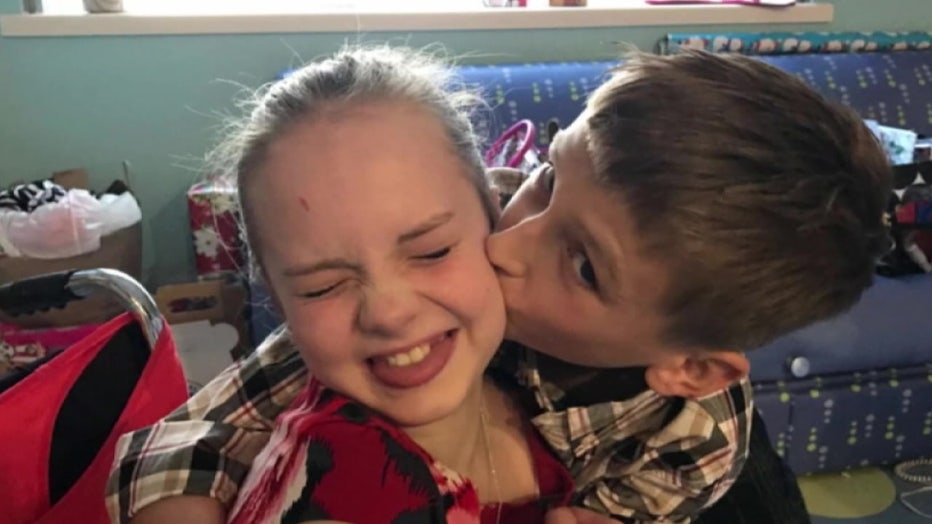
Pictured: Maya Kowalski and her brother Kyle
Now, the Kowalski family is suing Johns Hopkins All Children’s Hospital for $220 million, claiming its actions drove Beata Kowalski to suicide.
The defense, with its witnesses, is trying to establish that Maya did not have CRPS and should not have been given high doses of ketamine. Instead, the lawyers for Johns Hopkins All Children’s Hospital are arguing that Beata Kowalski has Munchausen by proxy, a form of abuse in which caregivers make up or induce illness in their children. Defense attorneys are arguing that the hospital and its staff was trying to protect Maya.
On Monday, doctors testified about why they were concerned about the nature of Maya’s illness and why they suspected her mother, Beata Kowalski, had Munchausen by proxy, and was making her daughter sick.
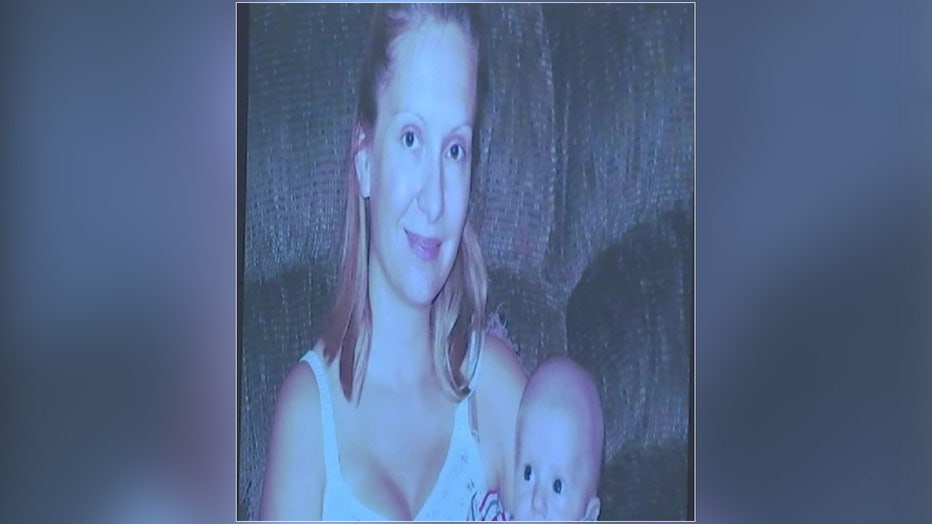
Pictured: Beata Kowalski
Last week, doctors and nurses from Johns Hopkins All Children’s Hospital took the stand for the defense. Critical care physician Dr. Beatriz Teppa-Sanchez described a chaotic scene when Maya and her mother, Beata Kowalski, first entered the pediatric intensive care unit.
She said Maya appeared to be in intense pain, though it was difficult to pinpoint where the pain was located. The doctor also said Maya kept demanding pain medication, which surprised her.
Dr. Teppa-Sanchez noted that Beata Kowalski said she had been very stressed and at times wanted to die and just go to heaven. The doctor added that Beata Kowalski said that when Maya was in a lot of pain, she too wanted to die and go to heaven.
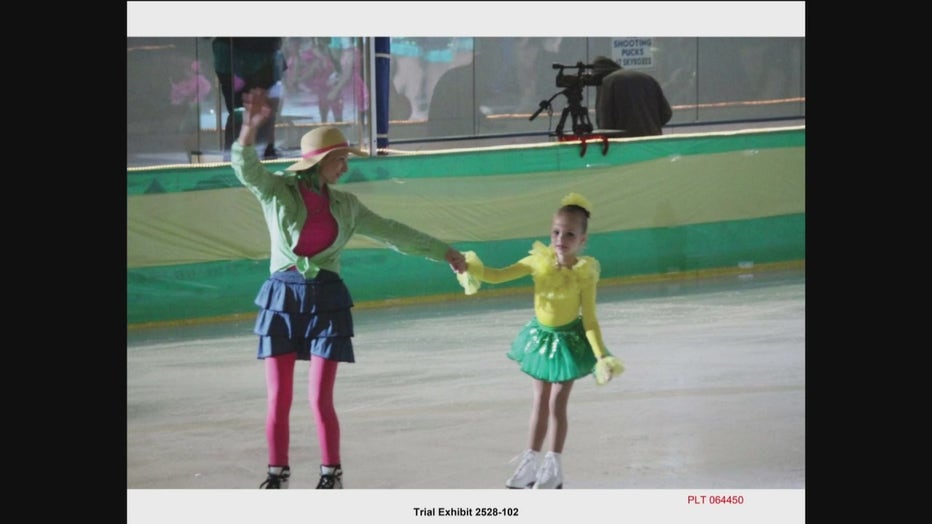
Maya and Beata Kowalski perform a figure skating routine.
The doctor told the jury she informed Beata Kowalski that the hospital could help her get resources to help, but the offer was declined.
Dr. Teppa-Sanchez said she felt those statements were even more reason for Maya to receive psychological help though Beata Kowalski said she didn’t want that for her daughter at that time.

Doctors, nurses testify in the ‘Take Care of Maya’ trial
Doctors and nurses who testified in court on Thursday described Maya and her mother as being aggressive in the hospital, swearing at medical professionals and demanding pain medication.
Nurse practitioner Johannah Klink echoed the statements of Dr. Teppa-Sanchez. She testified that Maya appeared to show more intense pain symptoms when her mother was present.
She went on to state that she witnessed Maya moving in ways that someone in intense pain would not be able to move such as get up on her knees on a hospital bed.
Klink also recalled Maya saying, "I’m tired of these lies. My whole life is a lie. That stuck me. That struck me very hard…It sounded to me like it was a cry for help."
However, during cross-examination, Klink told the jury that she never followed up on that statement or asked Maya to elaborate. She did note that she reported the statement to doctors.
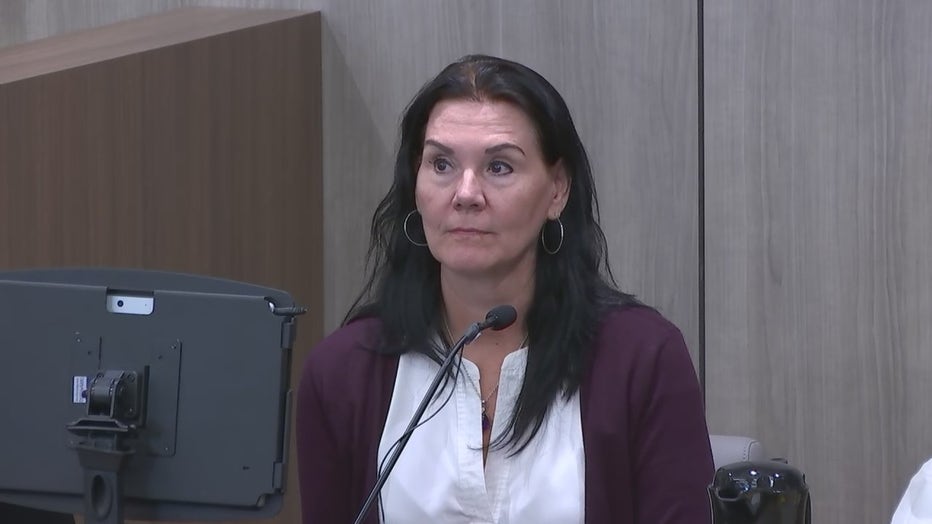
Nurse practitioner Johannah Klink testified on Thursday.
Before the plaintiffs rested, psychiatrist Dr. Scott Richards took the stand and told jurors how he believed Beata Kowalski felt she had no choice but to end her life.
"I believe the impulse happened for Beata Kowalski when she finally had the impulse that ‘I can do no more. I’ve gotten everyone in my life involved, no one can seem to help,’" said Dr. Richards.
"I liken it to someone who is impulsively having emotions, they write an email, and they hit send, and they wish they hadn’t of send it. In this case there was no delete. You couldn’t unsend the impulse," he added.

Psychiatrist testifies in 'Take Care of Maya' trial
On Monday, a physiatrist took the stand in a $220 million case against Johns Hopkins All Children's Hospital as defense attorneys began presenting their side.
Nurse practioner Bonnie Rice who worked at Tampa General Hospital and was a part of Maya’s care team in 2015 said Maya’s case was frustrating for the medical team because she said Maya and her mother weren’t open and she couldn’t move them down the road of recovery.
Rice added that Beata Kowalski was strictly seeking medical help for her daughter when the team at TGH suspected Maya’s pain may be psychological.
The team at TGH weren't the only ones to raise psychological suspicions.

Case workers testify for the defense in ‘Take Care of Maya’ trial
Jurors in the Take Care of Maya' trial heard testimonies from new witnesses on Tuesday, including staff members from Safe Children Coalition.
Dr. James Lewis, a neuropsychologist and a consultant for the Child Protection Team, told jurors he met with Maya after staff at Johns Hopkins All Children’s Hospital raised concerns that her mother may have been medically abusing her.
In a video deposition, Dr. Lewis stated that he believed Maya may have been suffering from a psychological symptom of pain, which may have triggered physical pain symptoms.
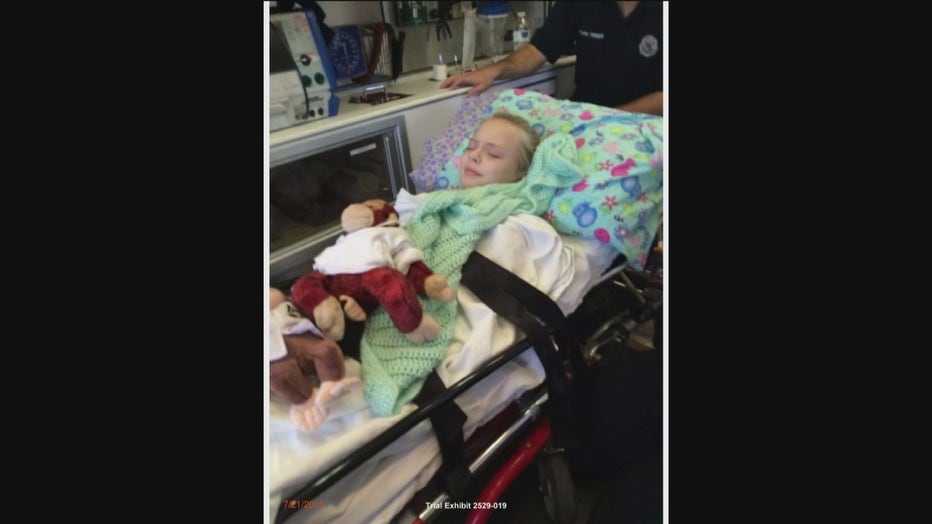
Pictured: Maya Kowalski
Dr. Teppa-Sanchez noted that she reached out to Dr. Sally Smith, a pediatrician who specialized in child abuse because she wanted her guidance on Maya’s case.
In a video deposition for the plaintiffs, Dr. Sally Smith, who was the medical director for the Child Protection Team providing a medical evaluation for Maya while she was at Johns Hopkins All Children's Hospital, said she knew that four other physicians had diagnosed Maya with CRPS.
She said she believed Maya’s mother, Beata Kowalski, was committing medical child abuse though she admitted that she had never testified in a case involving CRPS in the past.
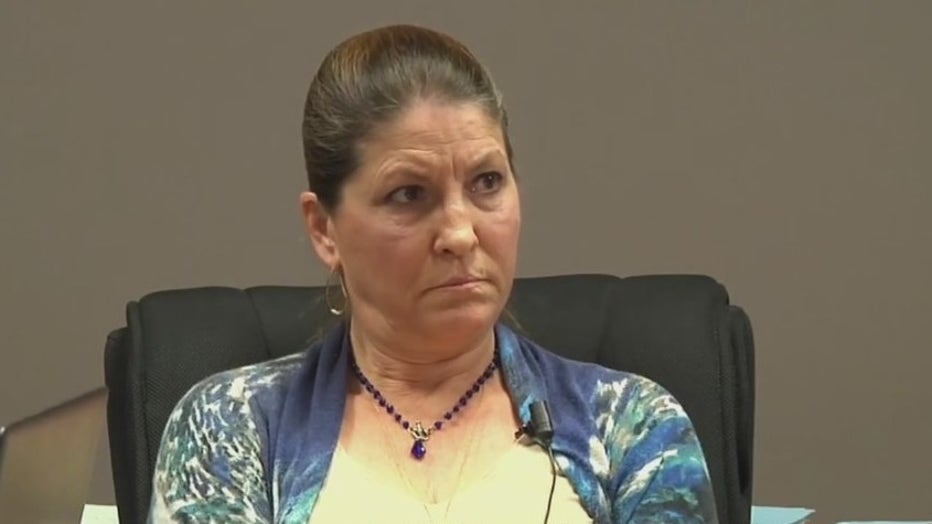
Jurors watched a video deposition of Dr. Sally Smith on Thursday.
"Upon review of all the extensive medical records, observations of the child in the hospital, review of the unconventional treatments including hyperbaric oxygen treatment and high dose ketamine treatment repeatedly. It was my opinion that there was ample evidence of medical child abuse and it appeared Mrs. Kowalski was the primary one who was resulting in instigating or perpetrating child abuse," Dr.Smith stated.
Dr. Smith also said she recalled that Dr. Anthony Kirkpatrick, who diagnosed Maya with CRPS and recommended ketamine treatment, advised her not to move forward with allegations that Beata Kowalski was suffering from Munchausen by proxy.
Jurors also heard Smith say she suggested doctors at Johns Hopkins All Children’s Hospital take Maya off of all medications.
Dr. Smith is expected to testify for the defense on Thursday, October 26.
What happened to Maya in the hospital?
Maya said, during her three months in state custody at the hospital, there was a 48-hour period where she was isolated in a hospital room. Maya said staff wouldn't help her go to the bathroom and, instead, tried to see if she could actually walk, but she couldn't.
RELATED: ‘Take Care of Maya’ trial: Maya testifies in $220 million case against All Children’s Hospital
"They left me there for 48 hours under surveillance, which they did not tell me about. They had a commode in there, and they just put it far enough away from the bed. So, I would have to physically stand up and use the bathroom," said Maya. "I called the nurses whenever I had to use a bathroom because obviously, I'm not able to walk. And when they refused to help me go to the bathroom, I would defecate on myself."
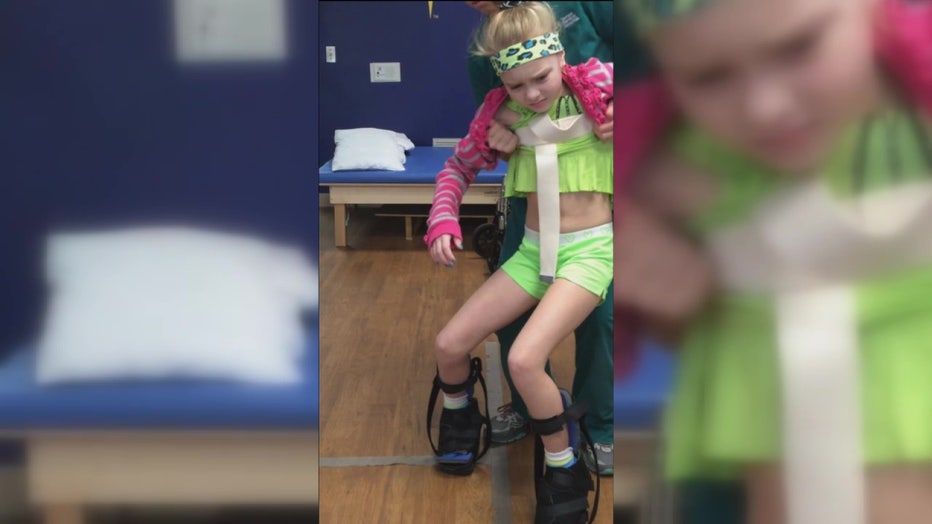
A video of Marissa Higgins helping Maya try to walk was shown in court on Friday.
She described some nurses as mean and unhelpful, and others as compassionate and willing to help. Her testimony on Monday was emotional at times as she expressed her frustration.
"When I express to them a symptom or like my pain, they would say, 'No, you're making it up,' or 'it's in your head,'" Maya said.

Maya Kowalski takes the stand
On Monday, Maya Kowalski took the stand in the 'Take Care of Maya' trial and told the jury about her experience being in state custody while at Johns Hopkins All Children’s Hospital for three months.
Why couldn't Maya's family take her home?
Jack Kowalski testified that his family was told they would be arrested if they left the facility with Maya.
He went on to describe how the hospital treated those who tried to visit Maya.
"Did you learn through the course of this that they believed Beata was slipping ketamine through the holy water and wafers?" the Kowalski's family attorney Greg Anderson asked.
"I know it didn’t happen, but they had all different ideas," Jack Kowalski replied.

Maya Kowalski's dad testifies
Maya Kowalski's father, Jack Kowalski, described the pain his daughter was experiencing as she suffered with Complex Regional Pain Syndrome when he took the stand Monday afternoon in a $220 million case against Johns Hopkins All Children's Hospital featured in the Netflix documentary 'Take Care of Maya'
Anderson argued those theories resulted in Beata Kowalski’s desperation and death by suicide.
"I saw my child deteriorating. I go home, I see my wife deteriorating," shared Jack Kowalski while on the witness stand.
PREVIOUS: ‘Take Care of Maya’ trial: What will the jury hear? Lawyers argue over evidence, witnesses in case
Attorney Mark Zimmerman, who represented Maya when she was at Johns Hopkins All Children’s Hospital, said he felt as if the facility, and, in particular, social worker Catherine Bedy, tried to put up barriers for him to access Maya.

Beata Kowalski with Maya and Kyle
A phone call between Beata and Maya that was monitored by woman Maya identified as Bedy was also played in court. Charlotte La Porte, a manager for Pathways stated that her voice could be heard in a recorded call redirecting conversation between mother and daughter after Beata Kowalski mentioned the case.
However, Maya’s former Guardian Ad Litem, Jessica Blackrick, testified that Bedy cut a phone short a phone call in which Maya and her mother were praying together.
Blackrick added that a phone call that Maya wanted to make to her mother on Thanksgiving was blocked by Bedy because she couldn’t make herself available to monitor it. Blackrick went on to state that she never told Bedy to monitor those phone calls.
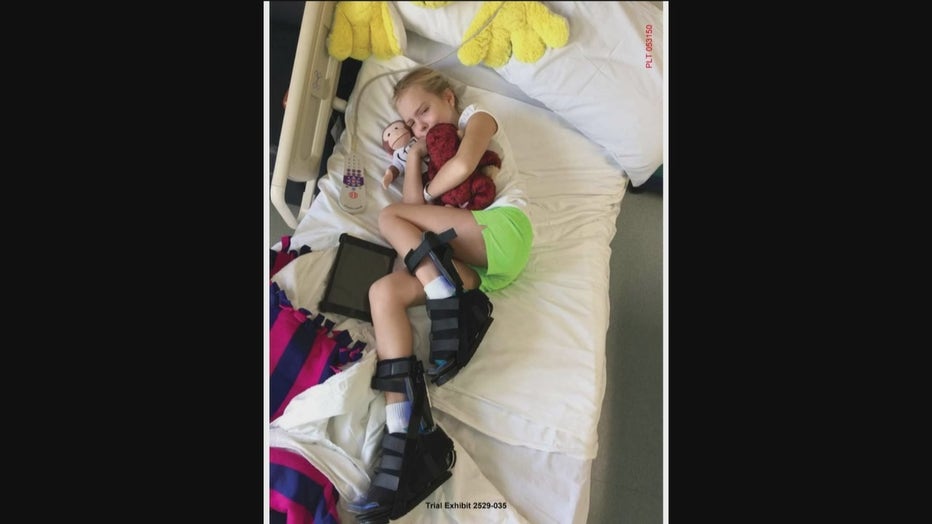
Pictured: Maya Kowalski with boots on her feet.
Lindsey Masica, who worked for DCF as a child protective investigator while Maya was at Johns Hopkins All Children’s Hospital stated during her testimony that she knew Bedy was listening in on phone calls between Maya and her mother.
The battery allegations from the Kowalski family stem from Bedy and others holding Maya down for unwanted photos and unwanted comforting.

Social worker deposition in 'Maya' trial
Jurors in a Sarasota County courtroom watched a video deposition from social worker Catherine Bedy as a $220 million case against Johns Hopkins All Children’s Hospital featured in the Netflix documentary ‘Take Care of Maya’ continued Thursday morning.
Bedy described how she met Maya and accused her mother, Beata Kowalski, of having Munchausen by proxy, but admitted she was not an expert on the disease and stated she had only worked with three similar cases.
Bedy said she saw Beata Kowalski demand ketamine for her daughter. Although the hospital says it believed the ketamine treatments were too dangerous, Bedy admitted that the facility did not take into consideration that Maya had been prescribed the ketamine treatments.
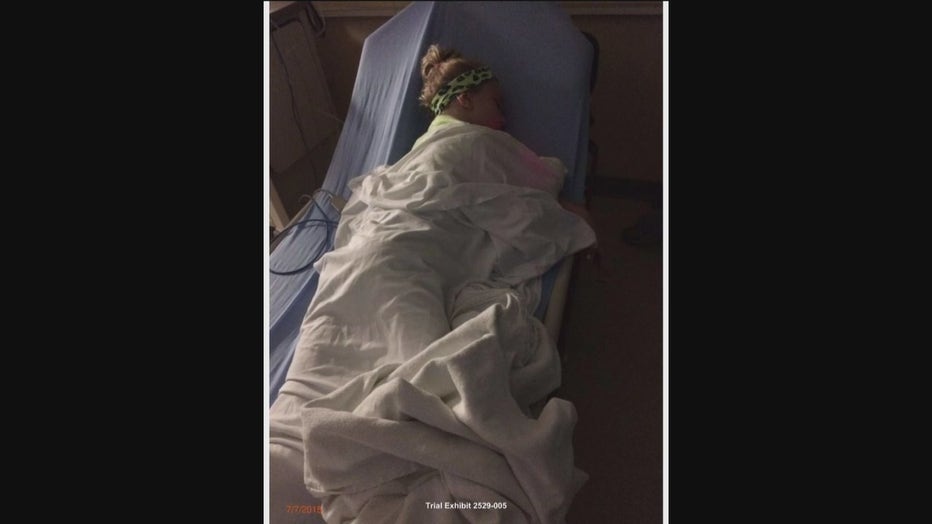
Maya Kowalski in hospital.
After seeing Bedy’s deposition, the jury was dismissed, while the court held a hearing on future evidence in the case. During the hearing, Maya’s father Jack Kowalski was asked about Bedy, and he said Maya couldn’t stand her.
"She stated she placed her on the lap. I never gave consent by the way on that. She stated that she used to come in and slap her leg to see if she was in pain, she said she wanted to adopt her that her mother was in a mental home, so she could be like her mother while in the hospital," he said.
Bedy is scheduled to testify for the defense on Monday, October 30.
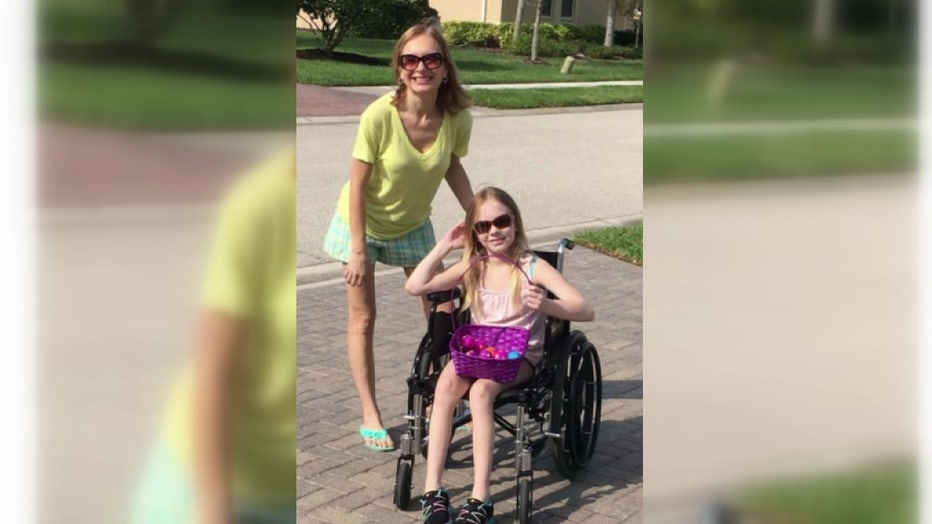
Pictured: Beata and Maya Kowalski
When Detective Stephanie Graham with the Sarasota County Sheriff's Office took the stand, an audio recording of her interview with Jack Kowalski was played for the jury. On the recording, he could be heard saying he was frustrated because his wife was talking about medical stuff during supervised calls with Maya after she was told not to discuss that with her.
The detective stated Jack Kowalski told her that when he was home alone with Maya she wouldn’t complain, but as soon as her mother came home, she would say she was in pain. She also noted that Jack Kowalski said he would have his wife move out if he could bring Maya home.
Why was Maya taking ketamine?
Beata Kowalski, who was a registered nurse, learned about CRPS from an infusion patient and began researching the disease. Her research led her to Dr. Anthony Kirkpatrick, who diagnosed Maya with CRPS and prescribed ketamine treatments.
RELATED: ‘Take Care of Maya’ trial: Doctor who prescribed ketamine treatments testifies in $220 million case
Dr. Kirkpatrick told the jury that initially Maya said the ketamine treatments helped, but not enough so he recommended a high-intensity treatment in Mexico, which he said was a success.

Doctor testifies at ‘Take Care of Maya’ trial
Dr. Anthony Kirkpatrick, the physician who diagnosed Maya Kowalski with Complex Regional Pain Syndrome and prescribed ketamine treatments took the stand in a $220 million case against Johns Hopkins All Children’s Hospital featured in the Netflix documentary ‘Take Care of Maya’.
"He explained the procedure. He talked about how it’s been around for quite a long time. He mentioned it’s used for many things, and it’s safe," Jack Kowalski stated during testimony on Monday. "The side effect when they’re coming out of it is a hallucination for a short time, but then everything is back to normal."
Upon cross-examination of Jack Kowalski, defense attorneys for the hospital questioned the family’s decision to move forward with ketamine coma treatment in Mexico.
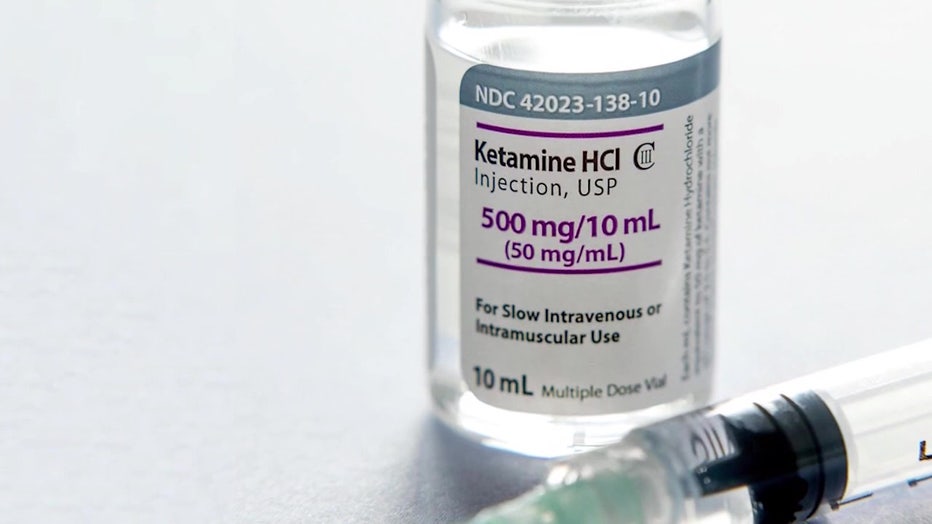
File: Ketamine
"Were you aware that the risk of death from that coma was 50%?" asked Ethen Shapiro.
"There is a risk in every procedure," Kowalski responded.
"I understand that Mr. Kowalski but respectfully there’s a risk and then there’s a risk that’s a coin flip in which your daughter could pass. Did you know it was 50%" Shapiro pressed on.
RELATED: ‘Take Care of Maya’ trial: Doctor who's treated thousands for CRPS testifies on behalf of Maya
"They stated it was 50%, but they stated no one every died from that procedure," responded Kowalski.
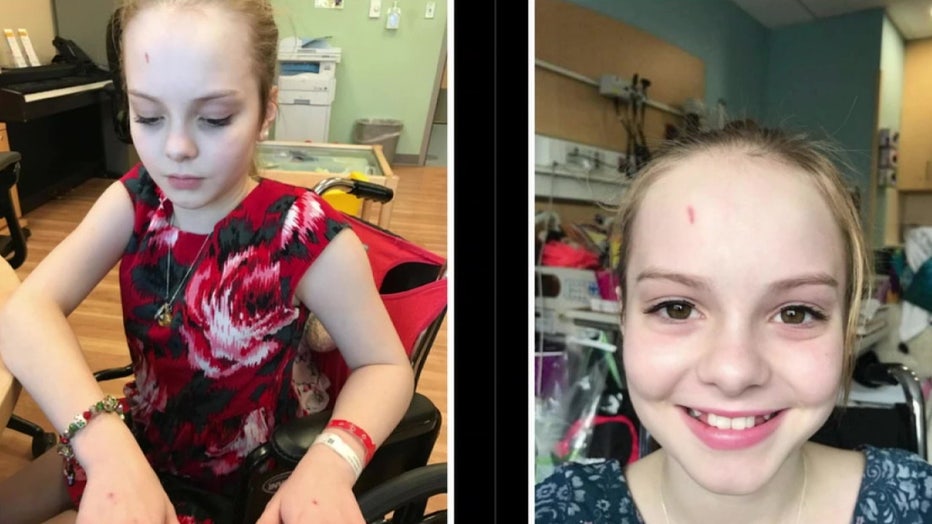
Side by side images of Maya Kowalski as she battled CRPS.
Maya’s father told the jury he and his family saw Maya slowly returning to herself following the ketamine therapy.
Dr. Kirkpatrick shared a similar testimony
"She could take care of herself, comb her hair, brush her teeth, eat with her hands and so forth" he recalled.
During a video deposition on Monday, Dr. Lewis stated that Maya had overheard doctors telling her mother that she had a 50 percent chance of dying during the ketamine treatment, which added to her anxiety.
RELATED: ‘Take Care of Maya’ trial: Doctor who prescribed ketamine treatments testifies in $220 million case
When Maya relapsed in 2016, the Kowalski family says staff at Johns Hopkins All Children's Hospital didn’t agree with the ketamine treatments.
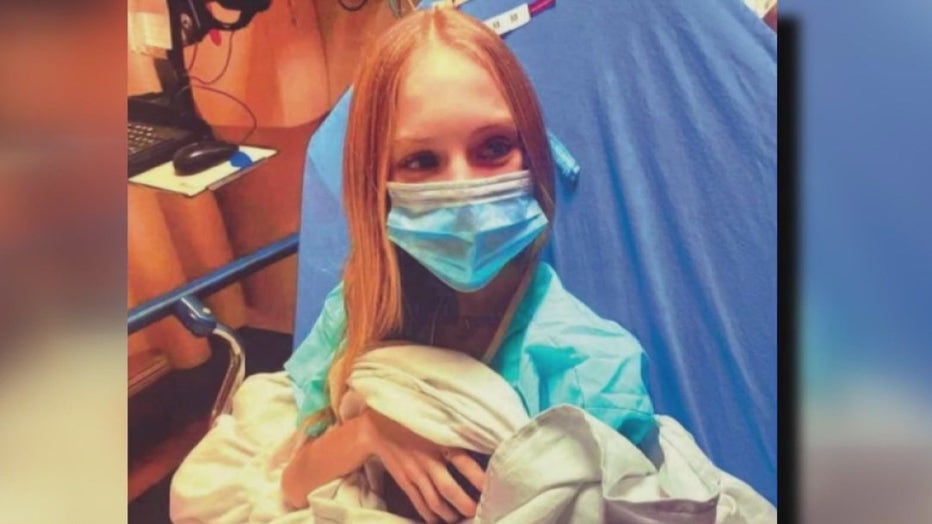
Maya Kowalski in the hospital.
Dr. Kirkpatrick said he discussed Maya’s condition with the hospital.
"I emphasized that if she doesn’t get the ketamine, it’s going to be a slow, painful death," Dr. Kirkpatrick stated.
Dr. Fernando Cantu, the doctor who administered Maya's ketamine coma, explained to the jury that while it will not cure CRPS, ketamine is a treatment for the disease.
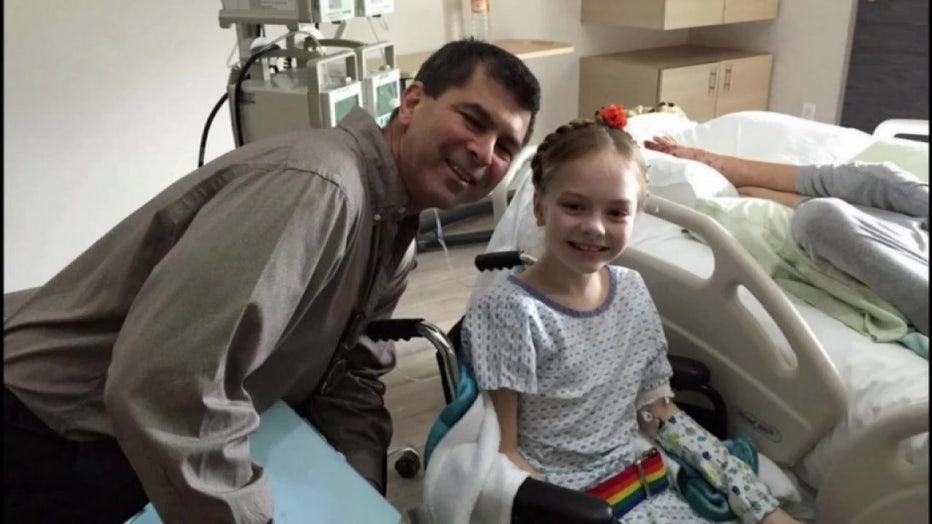
Maya and her physician Fernando Cantu.
What is Complex Regional Pain Syndrome?
CRPS is a rare pain disease that can follow an injury, and it’s tough to diagnose and sufferers are sometimes accused of faking their pain.
There’s no cure for CRPS and treatments can range from acupuncture and nutrition to physical therapy and massage or ketamine therapy.
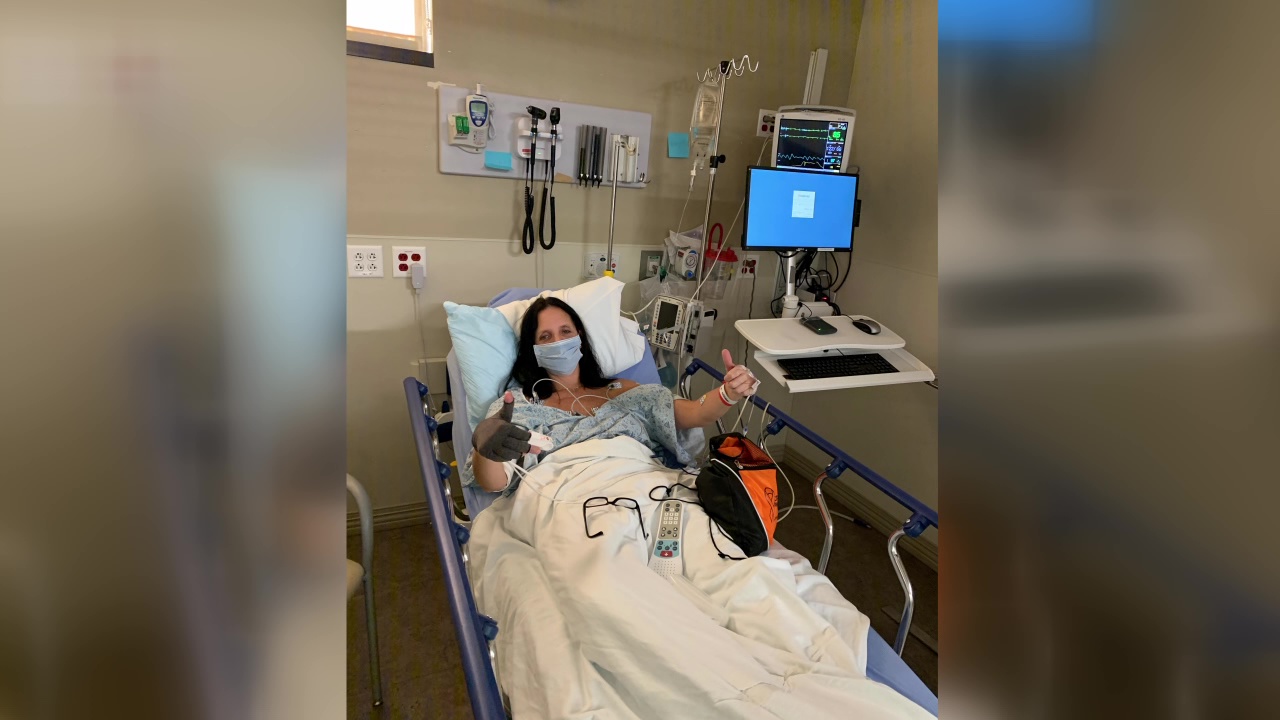
Woman describes living with CRPS
As the trial between the family of Maya Kowalski and Johns Hopkins All Children’s Hospital continues, a woman who is also living with CPRS described what living with the illness is like
The Kowalski family attorney argued that the hospital staff refused to believe Maya had CRPS even after Dr. Kirkpatrick, who did not work for All Children’s Hospital, confirmed her diagnosis.
PREVIOUS: ‘Take Care of Maya’ trial: Testimony continues in $200 million case against All Children’s Hospital
The Kowalski family claims that while hospital staff was accusing them of lying about CRPS and refusing to treat Maya, the facility was billing the family and their insurance more than half a million dollars for that exact cause of illness.
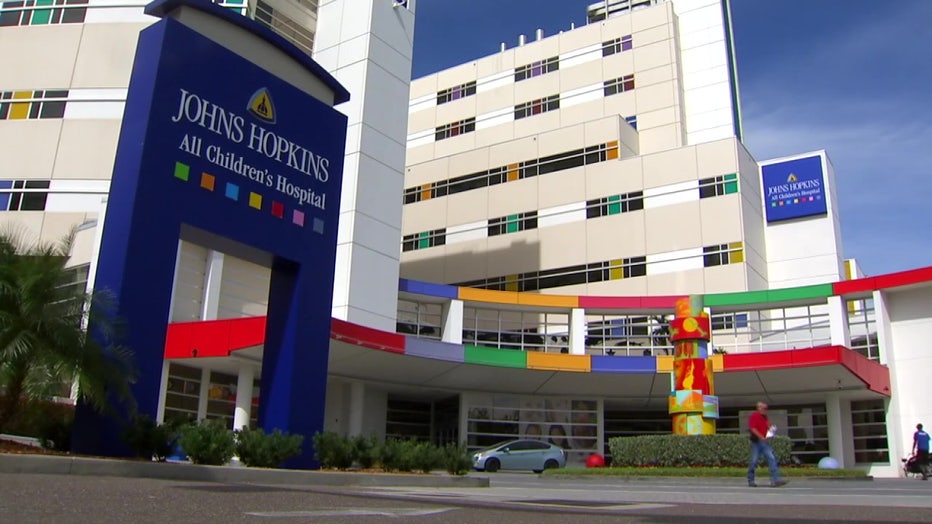
File: Johns Hopkins All Children's Hospital
Jurors will ultimately have to decide whether what happened to the Kowalski family could have been prevented and if the hospital’s actions pushed Beata Kowalski to take her own life.
"We ask in this case for you to consider not only compensatory damages to try to make them whole for these terrible things, but also punitive damages to deter them to punish them and to deter this type of behavior in the future," said Greg Anderson, Maya Kowalski’s lawyer.
An economist detailed expenses the family has incurred and will incur on the future and came up with $220 million.
The judge says he plans on giving the case to the jury by November 7 for deliberation.

